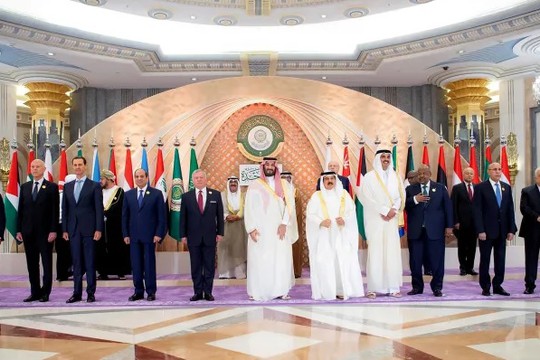Assad gets warm reception as Syria welcomed back into Arab League
President Joe Biden's Syria policy has been dealt its biggest blow yet as the Arab League has welcomed back President Bashar al-Assad despite U.S. opposition to his rule. Assad attended annual summit in Saudi Arabia for the first time since Syria's civil war erupted in 2011, his diplomats in New York say the return bears with it a message for the U.S. to end its ongoing military presence and sanctions targeting the country, notes ‘Newsweek’.
Saudi Foreign Minister Faisal bin Farhan Al Saud met with Assad on April 18 and the Arab League announced Assad's comeback on May 7. Three days later, Saudi King Salman invited the Syrian leader to attend the upcoming regional gathering in the Kingdom's Jeddah.
Damascus has counted the diplomatic rehabilitation as a win for Syria and other nations in the region.
"The Syrian Arab Republic believes that the positive tendencies and interactions taking place in the region are in the interest of all its countries, and contribute to restoring security and stability to the region, and allow directing efforts and capabilities to achieve the well-being of its people," the Syrian Mission to the U.N. said. "Syria has interacted constructively with these efforts based on its belief in dialogue, diplomacy and joint action, and its keenness to build the best relations with other countries."
When it comes to U.S. policy, the Syrian government's demands for the Biden administration are twofold.
On the military front, the Syrian Mission stated that "the U.S. administration must abandon its hostile policies towards Syria, start withdrawing its forces from Syrian territory, and stop supporting illegal militias and terrorist entities.
"The economic crisis and the huge inflation that the Americans are suffering from requires that they stop wasting taxpayers' money on establishing illegal military bases in Syria under pretexts that have been proven false," the Syrian Mission added, "such as defending U.S. national security thousands of miles away from Washington."
As for Syria's own economic situation, the Syrian Mission asserted that "the U.S. administration should also initiate the immediate lifting of the coercive measures imposed on the Syrians, which constitute collective punishment for them and the biggest obstacle to improving the humanitarian and living conditions, and providing basic services such as electricity, water and health care."
Washington, for its part, has expressed staunch opposition to any lifting of sanctions or normalization of relations with Assad, citing a lengthy record of alleged human rights abuses, including mass imprisonment, the targeting of civilians and the use of chemical weapons.
Secretary of State Antony Blinken explicitly rejected the recent developments bringing Assad back into the Arab fold when he told a press conference that "we do not believe that Syria merits readmission to the Arab League."
With Assad's government now back in the Arab League, she issued an appeal to regional countries to play a role in fostering negotiations toward bringing an end to the long-running war.
Moscow has more recently hosted discussions toward establishing a rapprochement between Damascus and Ankara. However, Assad's hand in seeking the withdrawal of U.S. forces appears to have only grown stronger. Earlier this month, just over a week before Syria's Arab League membership was restored, the top diplomats of Egypt, Iraq, Jordan, Saudi Arabia and Syria held their first meeting since the conflict began in Amman, during which they called for an end to foreign interference and the return of government control across Syria.
Moscow and Tehran, both of whom have repeatedly called for an immediate U.S. withdrawal, have also doubled down on their partnerships with Syria. Russian President Vladimir Putin received Assad in Moscow in March, days after the China-brokered Iran-Saudi agreement, and Iranian President Ebrahim Raisi made the first trip of its kind to Damascus since the war began earlier this month, shortly after the Arab foreign ministers' meeting in Amman.
Hours after Raisi's trip, the Iranian Mission to the U.N. told Newsweek that "Syria has entered a new era of stability and authority, according to our assessment."
"The doors of Syria will remain open to those who believe in dialogue, international law and the UN Charter," the Syrian Mission said, "far from intervention policies and attempts to impose dictates and starve people to undermine their national choices."
read more in our Telegram-channel https://t.me/The_International_Affairs

 11:39 23.05.2023 •
11:39 23.05.2023 •























